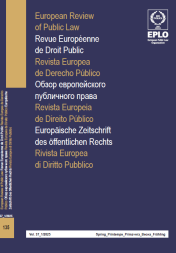
Constitutional Law / Droit constitutionnel
GREECE / GRÈCE
ANDREAS I. POTTAKIS
DPhil in Law (Oxon). Deputy Director of the Academy of European Public Law, Attorney at Law
The electoral results in both European and local/regional elections of May 2014 largely informed the political agenda for the remainder of the year, and set the confines within which both law-making and implementing were to be exercised by the Greek government. The chronicle reflects on the Greek legislation on elections to the European Parliament, taking up the occasion of the passing of Law 4255/2014 just before the elections of 2014 to review the main facets of the electoral system. The single new clause introduced by Law 4255/2014 was preferential voting; voters were, for the first time in Greece, given the opportunity to choose among the candidates proposed by each political party contesting the European elections. This rather modest change in the electoral system had a profound effect on voters and revitalised interest in the EP and the selection of its members, as demonstrated by the significant increase in voter turnout.
Les résultats tant des élections européennes que des élections locales/régionales du mai 2014 ont largement éclairé le programme politique pour le reste de l'année, et ont fixé les limites dans lesquelles tant le pro¬cessus législatif et la mise en œuvre des lois seraient exercés par le gouvernement grec. La chronique réfléchit à la législation grecque sur les élections au Parlement européen, en prenant l'exemple de l'adoption de la Loi 4255/2014 juste avant les élections de l'année 2014 pour réviser les principaux volets du système électoral. La seule nouvelle clause introduite par la Loi 4255/2014 concernait le vote préférentiel; la possibilité a été donnée aux électeurs, pour la première fois en Grèce, de choisir parmi les candidats proposés par chaque parti politique se présentant aux élections euro-péennes. Ce changement plutôt modeste dans le système électoral a eu un effet profond sur les électeurs et a revivifié l'intérêt au Parlement européen et la sélection de ses membres, cela étant démontré par l'augmentation significative de la participation électorale.




















